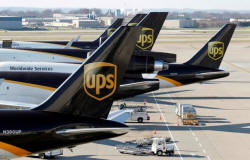|
The world's largest package delivery company said revenue at its
core U.S. domestic package service rose 8 percent during the
quarter to $9.7 billion. Revenue per package in the domestic
unit was up 3 percent versus the second quarter of 2016,
reflecting the fact that they raised prices.
Like its main rival FedEx Corp, UPS has experienced a boom in
ecommerce packages over the last decade. But the boom has come
at a price, as both companies have had to invest heavily in
their networks to handle the extra business.
The Atlanta-based company posted second-quarter net income of
$1.4 billion or $1.58 per share, up nearly 8 percent from $1.3
billion or $1.43 per share a year earlier. Analysts had expected
earnings per share of $1.47, according to Thomson Reuters
I/B/E/S.
UPS said higher fuel surcharges and workers' compensation
contributed 10 cents per share to earnings in the quarter.
Richard Peretz, UPS's chief financial officer, said in a
statement the results were in line with the company's
expectations.
"Looking at the second half of the year, our core business
performance will continue to produce solid results," Peretz
said.
The company said it expects full-year earnings per share in a
range from $5.80 to $6.10. Analysts expect earnings per share
for the year of $5.95.
In light premarket trading, UPS shares were up 1.5 percent at
$114.
The company said revenue in its international segment was up 2.8
percent but operating profit fell nearly 5 percent, hurt by the
strength of the U.S. dollar.
UPS also said revenue in the supply chain and freight segment
was up 12 percent, reflecting improving market conditions.
The company said it was investing more in its network to handle
the additional volume associated with ecommerce.
Like FedEx, UPS has struggled with the expense of "the last
mile" associated with delivering to residential addresses. The
cost per package to businesses is typically lower because they
receive more deliveries.
UPS said year-to-date capital expenditures to support investment
strategies were $2 billion, and operating costs for facility
construction and Saturday operations to handle growing ecommerce
business increased costs by about $35 million.
(Reporting By Nick Carey and Eric M. Johnson; Editing by Nick
Zieminski)
[© 2017 Thomson Reuters. All rights
reserved.] Copyright 2017 Reuters. All rights reserved. This material may not be published,
broadcast, rewritten or redistributed.
 |
|




